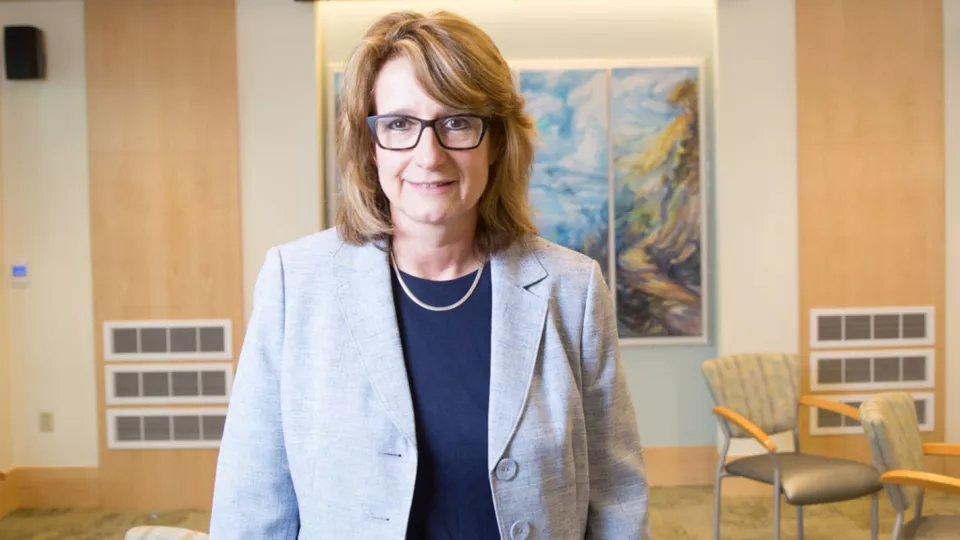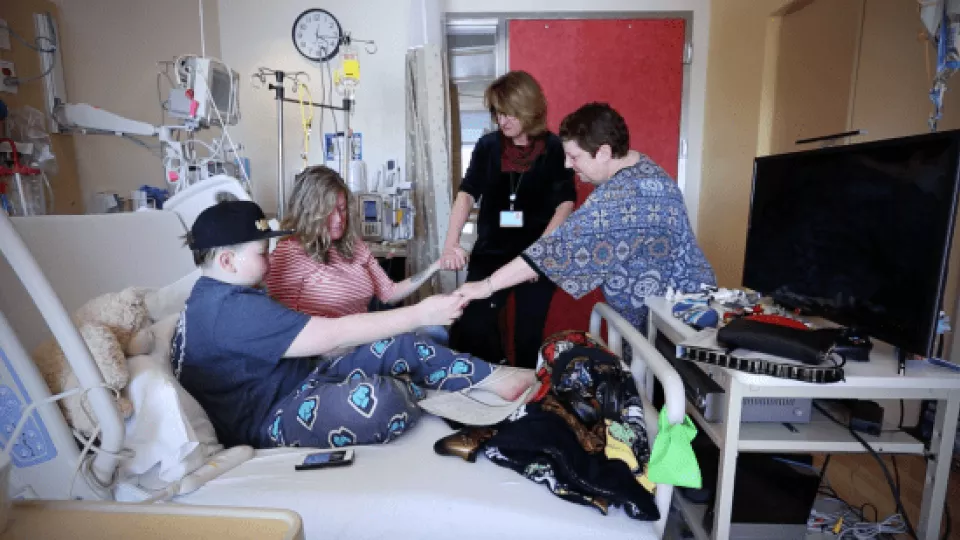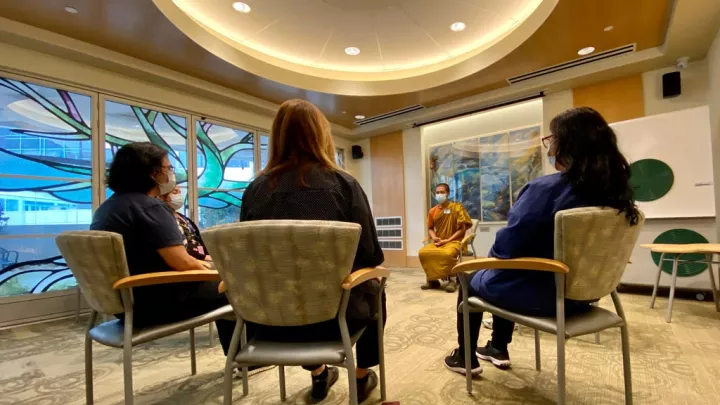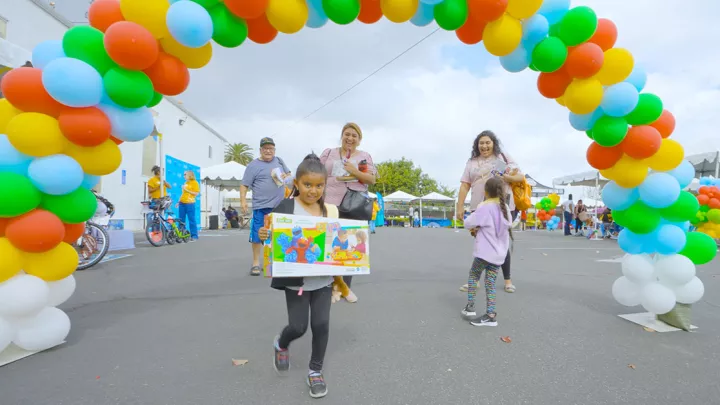
Soul Searcher
In high school, Dagmar Grefe gravitated to all kinds of different subjects, including theology, psychology, philosophy and history. But when one of her teachers predicted she would pursue a career in theology, the teenage Grefe balked.
“I’d have to become a minister,” she remembers protesting, “and that’s an outdated profession.”
Telling this story today, Grefe—now Rev. Dagmar Grefe, PhD—lets out a long laugh. “I guess I changed my mind!”
Indeed, there is nothing “outdated” about what Grefe does for a living. An ordained minister in the United Church of Christ and manager of the Spiritual Care Services Program at Children’s Hospital Los Angeles, she comes face-to-face on a daily basis with some of the deepest, most difficult and universal questions of life: Does God exist? Why is there suffering? And what is the meaning of life and death?
Grefe, of course, does not have answers to those questions. And that is OK with her.
“Most of faith is really about searching,” she says. “It’s searching for truth more than actually knowing anything.”
Wondering about God
Grefe grew up in the picturesque rural town of Altena, Germany—home to gently rolling hills, a famous 12th century castle and seemingly endless woods.
Church was part of her upbringing, but as she reached her teen years, she also began to look more critically at her Christian faith, and even question her own belief in God. Still, when it came time to pick a career path, theology called the loudest.
“I guess it had a little bit of a hold on me,” Grefe says. “I was wondering about God and the world and life.”
She also had a good deal of wanderlust and a deep desire to learn about other cultures. After her university graduation in Germany, where she studied theology, she dreamed of going to Africa.
When no positions were available, she headed instead to Lexington, Kentucky, for a one-year intercultural exchange program with the World Council of Churches.
It was life-changing. She met not only Americans, but also students and teachers from such far-flung places as Uruguay, Turkey and Sri Lanka. She also did an internship in an African-American community in Indianapolis, living for a month with a local family.
“I ate up all the diversity,” Grefe says. “When you move outside your own culture, you realize how many things you’ve taken for granted, and that the world as you’ve known it for 20 years doesn’t have to be this way. People in other places approach life differently. It’s fascinating and interesting, but it can be disorienting, too. I find it enriching.”
She ended up expanding her stay and doing a residency, working as a volunteer chaplain in a psychiatric unit and in hospice care. Neither was an easy place to be, and more than once she left in tears. But she was making an impact on people’s lives. And hard as those lives were, they inspired her, too.
“In the psychiatric unit I would do support groups,” she recalls. “It was interesting to watch people. They were helping each other, supporting each other. I remember one day thinking, ‘Wow, the soul has an amazing ability to work with suffering and somehow create something positive.’”
Serving all faiths
After returning to Germany to work with an inner-city congregation, Grefe came back to the United States in 1997, this time to Southern California. She took a job as a hospital chaplain while earning her doctorate in theology and personality at the Claremont School of Theology.
In 2002, she arrived at CHLA to take over as manager of the Spiritual Care Services Program. She quickly fell in love with the hospital and its commitment to serving children and families from all walks of life. But with only one other full-time chaplain and a part-time contracted priest, she didn’t have nearly enough staff to cover the tremendous demand for spiritual care across the hospital.

“The nurses all had these Rolodexes, and they’d be calling around in the middle of the night, trying to find [a chaplain or clergy] for families,” Grefe recalls.
Her first task: expanding the program’s Clinical Pastoral Education training into a year-round, accredited program. With the resulting interns, residents and fellows, she launched an on-call service, enabling 24/7 chaplain coverage in the hospital.
Today, thanks to generous philanthropic support, the program has four full-time chaplains. With the additional staff, Grefe has fostered the integration of chaplains with patient health care teams (when needed) and deepened relationships with diverse religious and spiritual organizations in the community.
True to her passion for interfaith care—she wrote a book on the subject, “Encounters for Change,” in 2011—the program goes to great lengths to serve people from all religions, or no religion at all. That commitment is symbolized most vividly in the Thomas and Dorothy Leavey Foundation Interfaith Center, which opened at the hospital last year.
Grefe spearheaded the creation of the Center, a unique space that brings people from multiple religions together under one roof, while providing specially designed alcoves for Catholics, Western and Eastern Christians, Jews, Muslims, Buddhists and Hindus.
“I really believe that people from different religious and spiritual traditions can learn a lot from each other,” she says. “We have differences, and those differences can lead to conflict. But we are united as human beings.”
‘A deeply spiritual place’
As a woman, Grefe knows she doesn’t always fit people’s image of clergy (although more women are entering the field in certain denominations).
But it’s easy to see that she found her calling as a chaplain. With her soft-spoken demeanor and gentle, lilting German accent, she exudes a sense of calm and peace.
When you talk to her, you get the feeling she’s truly listening—because she is. She’s learned over the years that the act of listening is a powerful thing. It can’t cure a child’s illness or take away a parent’s anguish. But it’s healing all the same.
“Just being with people in their suffering is a deeply spiritual place,” Grefe notes. “You can’t answer why something is happening. But you can witness what’s happening. You walk with them. You support them in their own questioning, so they find the answers that are meaningful for them.
“You see sadness, you see suffering,” she adds. “But you see a lot of resilience, goodness and caring, too. You see people helping each other. It’s a privilege when people let you be part of that journey.”


